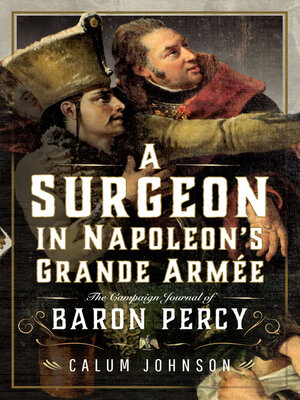
Sign up to save your library
With an OverDrive account, you can save your favorite libraries for at-a-glance information about availability. Find out more about OverDrive accounts.
Find this title in Libby, the library reading app by OverDrive.



Search for a digital library with this title
Title found at these libraries:
| Library Name | Distance |
|---|---|
| Loading... |
Pierre-François Percy was Surgeon-in-Chief of Napoleon’s Grande Armée. This is the first English translation of Baron Percy’s notebooks, containing his interesting, revealing, and informative testimony of the Revolutionary and Napoleonic campaigns in which he played an active role, as the most senior surgeon in the French Army, from 1799-1807.
In his journal, Percy writes intimately about his life on campaign. He recounts his experiences across Europe, particularly in Switzerland (Helvetia), Germany, and Poland. The journal shows Percy’s delight at seeing his surgeons recognized for their work at Eylau, and his notes express his shock at the brazen corruption of military officials and the indiscriminate pillaging to which the French army frequently resorted. He recounts his audiences with Napoleon, during which his pleas for more resources and a more professional military surgical corps frequently fell on deaf ears. Details that may have seemed trivial to Percy’s contemporaries – about food, accommodation, dress, and transport – now offer a vital insight into the persistent struggles, and occasional pleasures, of those who followed Napoleon on his quest to conquer Europe.
Percy documents his experiences of some of the major battles of the period; namely, Jena, Eylau, and Friedland. As a surgeon, he witnessed the enormous scale of devastation wrought by these significant battles, so often glorified in the historiography as tactical successes. His descriptions are meticulous and personal; injuries are described scientifically, their stark details offering a vivid and horrifying picture of the aftermath of the fighting.
Percy’s singular position – living with the soldiers and sharing in their poor conditions, while also being aware of the administrative decisions that governed (and often negatively impacted) their lives – makes for an account that is simultaneously fascinating for the general reader and invaluable for scholars of military and surgical history.
In his journal, Percy writes intimately about his life on campaign. He recounts his experiences across Europe, particularly in Switzerland (Helvetia), Germany, and Poland. The journal shows Percy’s delight at seeing his surgeons recognized for their work at Eylau, and his notes express his shock at the brazen corruption of military officials and the indiscriminate pillaging to which the French army frequently resorted. He recounts his audiences with Napoleon, during which his pleas for more resources and a more professional military surgical corps frequently fell on deaf ears. Details that may have seemed trivial to Percy’s contemporaries – about food, accommodation, dress, and transport – now offer a vital insight into the persistent struggles, and occasional pleasures, of those who followed Napoleon on his quest to conquer Europe.
Percy documents his experiences of some of the major battles of the period; namely, Jena, Eylau, and Friedland. As a surgeon, he witnessed the enormous scale of devastation wrought by these significant battles, so often glorified in the historiography as tactical successes. His descriptions are meticulous and personal; injuries are described scientifically, their stark details offering a vivid and horrifying picture of the aftermath of the fighting.
Percy’s singular position – living with the soldiers and sharing in their poor conditions, while also being aware of the administrative decisions that governed (and often negatively impacted) their lives – makes for an account that is simultaneously fascinating for the general reader and invaluable for scholars of military and surgical history.







